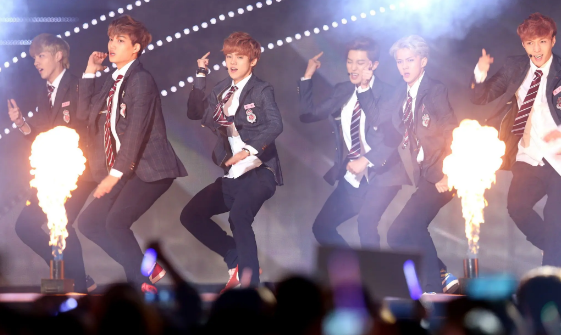
。。。Starnews,通过法新社 — Getty Images
我们每天发表一篇文章,以表彰第四届年度学生社论大赛的前 10 名获奖者。
下面是胡一佳的一篇文章,17岁。
Leave the Citizens to Their TV Shows
Soon after South Korea and the U.S. issued a joint statement confirming the deployment of the THAAD missile defense system in South Korea on July 8th, 2016, Korean TV shows began mysteriously vanishing from mainstream media outlets in China. Though a Chinese foreign ministry spokesman has denied any official clampdown on Korean entertainment, the blow to the industry has been remarkable. Proponents of continuing the unofficial ban on Korean cultural products believe that its economic impact makes it worthwhile. Unfortunately, they fail to realize that such a ban is actually counterproductive and that there are more effective ways for China to make its disapproval of THAAD.
It is undeniable that China’s entertainment industry is less competitive internationally than its Korean counterpart. Even domestic audiences criticize Chinese shows for being cliché and lacking creativity and depth. According to a New York Times interview with the Chinese journalist and long-term Korean entertainment industry analyst Fan Xiaojing, “The Koreans continue to do well because of the details. China just can’t capture the romance.” The innovative themes and delicate scenery featured in Korean shows have captured the hearts of millions of Chinese viewers.
The recent widespread introduction of Korean shows in China has helped Chinese entertainment gain new insights in the field. The Chinese version of “Running Man,” a popular Korean reality show, got a national rating of 4.167 percent in the first half of 2016 — over double the average rating — thanks to the contributions of original members of the show’s Korean production team who assisted with the Chinese version’s creation. Since South Korea and China are East Asian countries, they share similar cultures and values, which makes it easier for them to learn from one another. Banning cultural exchange with South Korea actually serves to block the future development of Chinese show business.
Even worse, such an informal ban runs the risk of solidifying the anti-Korea sentiment already brewing in China. The de facto exclusion of Korean entertainment sends a dangerous message, suggesting that the position of the South Korean government directly stands for the opinions of its people. It is now common to see comments like “Get out of China!” below Korea-related Chinese internet posts. Will this narrow-minded nationalism lead to extreme consequences? One can hardly predict.
Instead of imposing unofficial and counterproductive limits on cultural exchange, the Chinese government should continue working on a diplomatic solution to the THAAD crisis by continuing to promote multilateral negotiations among the countries involved, including North Korea. If such negotiations fail, then the government could consider imposing explicit and clearly-defined economic sanctions against South Korean industry to better express its strong opposition to the missile defense system while leaving citizens to their TV shows.
Works Cited
Amy Qin. “China’s Love Affair With Irresistible Korean TV.” The New York Times. 20 Jul. 2015.
Nicola Smith. “South Korea’s ‘K-pop’ Stars Caught in the Crossfire of Diplomatic Spat.” The Telegraph. 4 Dec. 2016.
Chris Buckley and Somini Sengupta. “U.S. and South Korea Rebuff China’s Proposal to Defuse Korea Tensions.” The New York Times. 8 Mar. 2017.
“2016 Shangban Nian Zong Yi Jie Mu Shou Shi Lv Pai Hang Bang” [Rating List of TV Variety Shows in the First Half of 2016]. 22 Jul. 2016.